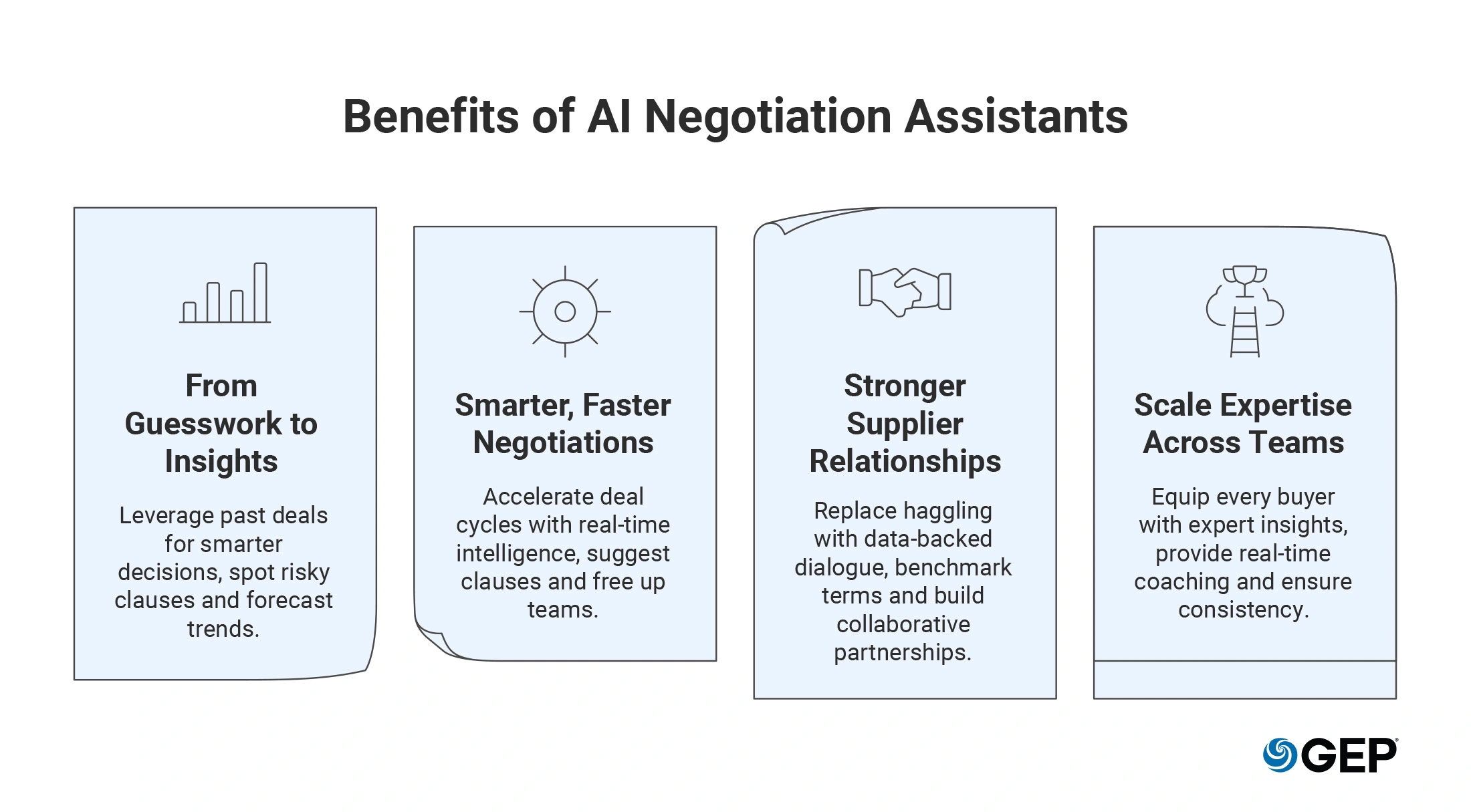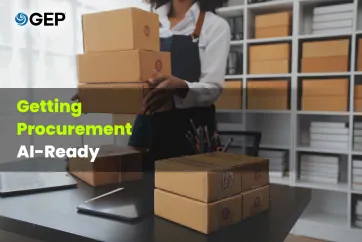
Meet the Intelligent Negotiation Assistants Reshaping Contract Lifecycle Management
- AI-powered negotiation assistants leverage data-driven insights from past deals to let procurement teams handle contract discussions with clarity and confidence.
- These AI-powered capabilities are making negotiations more strategic and proactive.
- Intelligent negotiation assistants can strengthen supplier relationships, accelerate deal cycles and yield business outcomes.
October 08, 2025 | Contract Management 5 minutes read
From High-Stakes Haggling to Smart, Strategic Dialogue
Contract negotiation is where business priorities meet supplier realities, and where parties define costs, risks and, ultimately, relationships.
Despite its strategic importance, though, contract negotiations can be held back by limited visibility into past agreements and subjective decision-making. Even seasoned procurement professionals can find themselves navigating blind spots, relying on fragmented data or spending hours hunting for precedents buried in emails or spreadsheets.
That’s starting to change with the current generation of AI-powered contract lifecycle management tools. Gartner anticipates that fully half of all companies will use AI to help negotiate supplier contracts by 2027.
Thanks to recent advancements like AI-powered negotiation assistants, procurement teams are gaining new leverage through intelligence.
These tools are making negotiation more data-driven, strategic and collaborative. Here’s what negotiations look like with AI-powered CLM tools and what that means for procurement leaders.
Curious How AI-Powered Negotiation Assistants Can Elevate Your Procurement?
Talk to Our Expert
The New Role of AI in Negotiation
AI in procurement isn’t new. Spend analysis, sourcing, supplier risk scoring and demand forecasting have all made massive leaps thanks to machine learning and natural language processing. But contract negotiation is (historically, anyway) a uniquely human and high-stakes domain, and AI’s role here is both more nuanced and more powerful.
AI-powered negotiation assistants embedded in CLM platforms enhance rather than replace human judgment. They analyze contract data, including pricing structures, payment terms, service level agreements and performance metrics to identify what’s happened in past deals and past contracts.
These AI assistants can bring the risk context to supplier negotiations and guide procurement teams to the best outcome, generating actionable insights at critical moments in the negotiation process.
Instead of starting from scratch or relying on gut feel, procurement teams can walk into discussions equipped with a clear understanding of:
- What similar deals looked like in the past
- How terms have trended over time
- Which clauses are most likely to cause delays or disputes
- What concessions may be worth offering or resisting
AI provides information, but it also delivers context. And in negotiation, context is power.

A Smarter, Faster, Fairer Contract Negotiation Process
Consider a typical supplier negotiation. You’re working to renew a key contract, but your internal stakeholders are pushing for better pricing and tighter delivery windows. Meanwhile, the supplier wants a longer-term commitment and more flexibility on penalties. With a negotiation assistant, you could quickly compare this supplier’s historical terms with similar vendors. You might discover that:
- The supplier has historically accepted 2% early payment discounts with other clients.
- Their lead times in the last three contracts were longer than industry average.
- A previous penalty clause led to a dispute that delayed implementation by two months.
Now you’re no longer negotiating in the dark. With that information, you can make targeted asks, avoid landmines and structure mutually beneficial proposals.
More importantly, you’re spending less time debating. Letting AI do the legwork on research and analysis allows you to focus on building trust and driving value.
Reframing the Relationship With Suppliers
What’s the most underrated benefit of AI in contract negotiation? It might be how it changes the tone of the conversation.
Too often, negotiations devolve into zero-sum contests: your win is their loss, and vice versa. But when both sides have access to shared data, or at least know that terms are being evaluated objectively, the dynamic shifts.
Instead of haggling over percentages, you’re co-solving based on insights. You can point to industry benchmarks, show what’s worked before and invite collaboration on mutually beneficial terms. This not only accelerates deal-making but also builds goodwill, especially with strategic suppliers.
Getting Deals Done Faster While Managing Risk Better
When you're working against tight deadlines and every contract could blow up in your face, having AI help with negotiations isn't just nice to have: it actually moves the needle. AI-powered CLM cuts through the redlining marathon by spotting problem clauses almost instantly. It'll catch when suppliers try to sneak in non-standard terms, push back with your preferred language, and even give you a heads up on which points they're likely to dig their heels in on (based on how similar deals have played out before).
What this means for legal and procurement teams is less time playing word detective and more time thinking strategically about what really matters in each deal.
The best part? These systems actually get better as you use them. Each completed negotiation teaches the AI something new about your industry, your company's priorities, and what actually works when push comes to shove.
Scaling Expertise Across the Organization
Another game-changing advantage? AI helps democratize negotiation expertise. Not every team member is a seasoned dealmaker. But with an intelligent assistant, even junior professionals can negotiate with greater confidence. The AI provides guardrails, recommendations, and justifications, effectively coaching users in real time.
This levels the playing field and empowers procurement organizations to scale their impact. No longer reliant on a handful of experts, teams can pursue more opportunities, handle more volume and take a more consistent approach to supplier engagement.
Looking Ahead: Negotiation in the Age of Autonomy
As generative AI continues to evolve, we’re likely to see negotiation assistants grow even more sophisticated.
Some platforms are already experimenting with autonomous agents that can simulate negotiations based on predefined business goals and risk thresholds. These agents can draft counteroffers, assess supplier responses and propose optimized terms before a human ever enters the room.
While we’re still in the early stages of that evolution, the direction is clear: procurement negotiation is moving from art to science. Relationships and soft skills will still be relevant, but those human interactions will be better informed, more strategic and ultimately more successful.
The Intelligence Advantage
Contract negotiation will always involve a degree of tension. But with the right AI tools, procurement leaders can turn them into a true source of competitive advantage.
By surfacing insights from past agreements, identifying trends and guiding deal strategy, AI-powered negotiation assistants are helping procurement teams drive better relationships with suppliers and better outcomes.
Discover More: Contract Management Software Solutions



